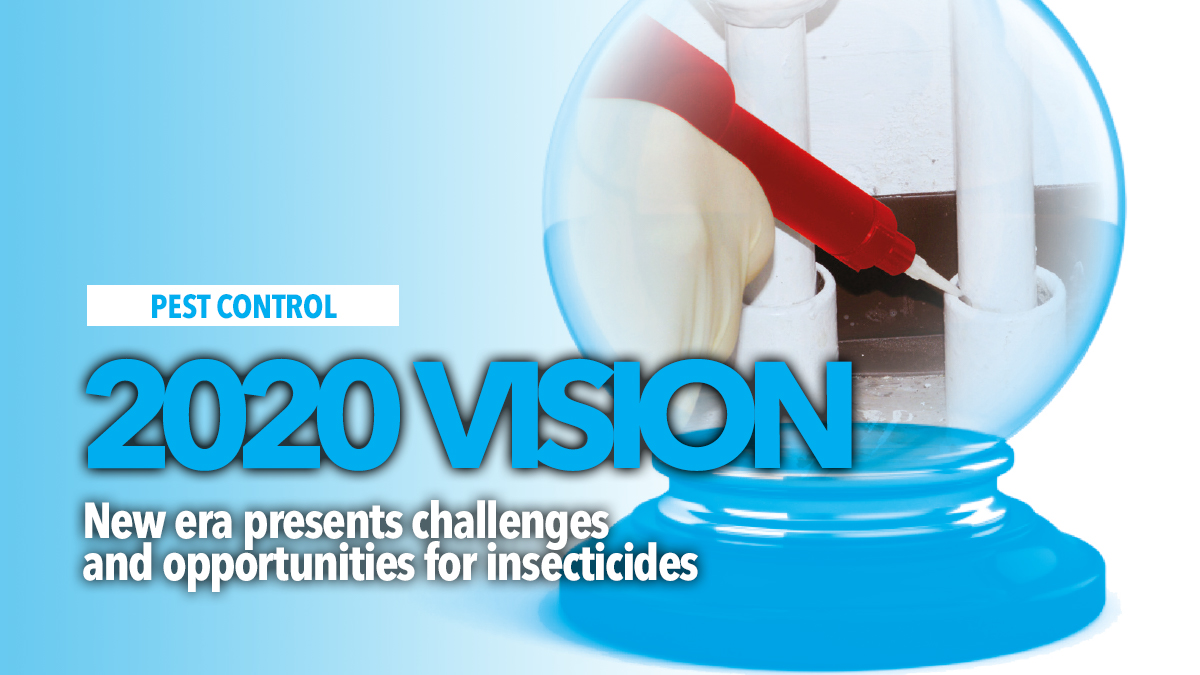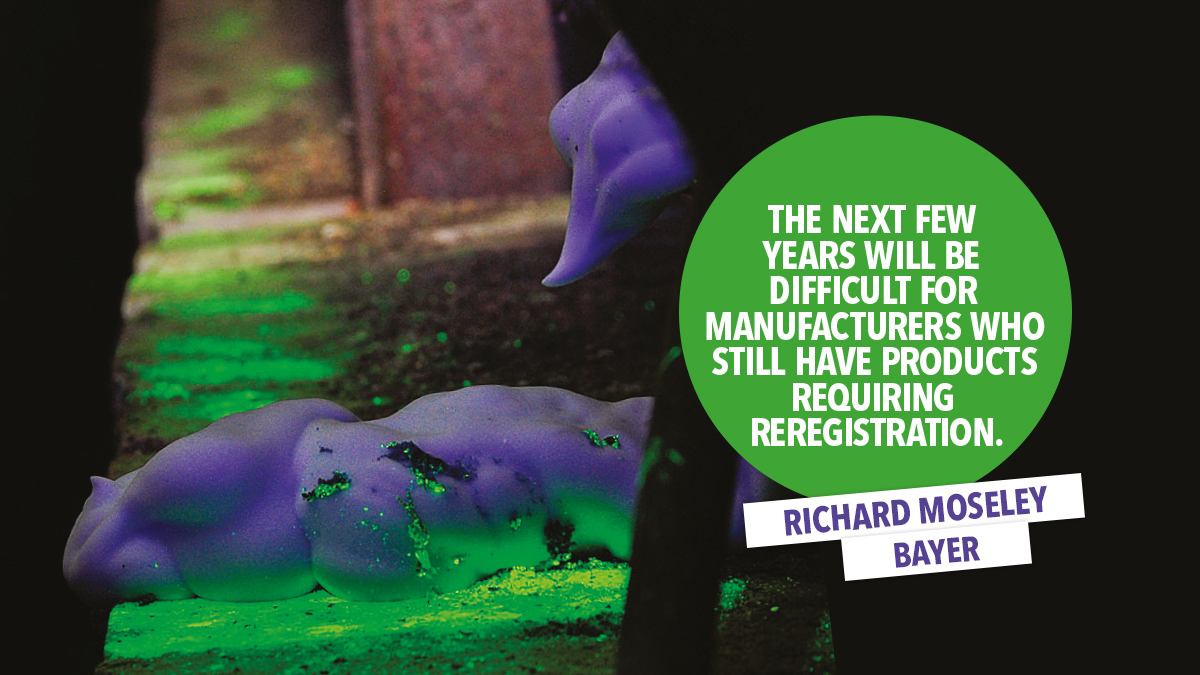Pest control | PPC98 March 2020
With fewer insecticides available than in the past, keeping informed about insecticide product options is more important than ever for all parts of the pest management industry.
Richard Moseley, Bayer technical manager, gives us an insight into the future of insecticides and some tips on how best to use them.
SPEED VIEW
- Fewer insecticides are available largely due to changes in the registration process and implementation of BPR
- Existing formulations are designed for a different registration system and are not necessarily suitable for new requirements
- Product rotation maximises efficiency and reduces resistance but, with fewer products, it is harder to implement
- Manufacturer-led research is developing new formulation technologies for proven, existing active ingredients
- Registration can be tedious, with products taking 10+ years to come to market
- Registration is designed to protect consumers by ensuring products are effective and consumer-friendly from a health and safety perspective
- Despite Brexit, it is likely that rules and regulations will remain similar for years.

Manufacturers are continually investing in research to find new insecticide solutions, and there are some invaluable new formulations coming through the registration pipeline.
But these are relatively few and far between.
This is why it has to be an industry-wide priority to build and share knowledge on which products and practices work best in different situations.
We also need to share how to protect against resistance.
There is a common trend of fewer insecticides being available to the pest control industry, primarily due to the changes in the registration process and the implementation of the Biocidal Products Regulation (BPR).
When you look at some of the existing formulations on the market, they’re designed for a different registration system, the Control of Pesticides Regulation (COPR).
They are not necessarily suitable for the requirements of newer registration processes.
New products can be better designed to fit into the current Biocidal Products Regulation registration framework.
It’s essential to design a new product or technology with the future in mind.
Product rotation is vital to maximise efficiency and reduce the risk of resistance, but one of the issues with losing insecticides from the market is that it can be harder to implement this.
An essential part of Integrated Pest Management (IPM) is switching between product families with different types of active ingredients.
If you lose an option, it’s crucial alternatives are available, whether it be a new formulation or a growth regulator for instance.
So major manufacturers are highly committed to investment in new formulations.
Enhancing proven actives
Much manufacturer-led research is now invested in developing new formulation technologies for proven, existing active ingredients.
It is focused on finding the best route or method to apply the active, looking at how to introduce the product to the insect in the most effective way.
For example, Bayer is investing in advanced formulation technology that will make the active perform at it’s very best.
If the formulation is performing well, a smaller amount of active ingredient goes a lot further.
Using less product is important from an environmental point of view.
Likewise, the fewer treatments carried out, the lower the chance of pests developing resistance.
There can often be very specific situations that need an effective ingredient in a particular format.
If the formulation is performing well, a smaller amount of active ingredient goes a lot further. Using less product is important from an environmental point of view.
Richard Moseley, Bayer
For example, Ficam D® delivers bendiocarb via a dustable powder, which is well-suited to controlling wasps and ants in hard-to-access cavities and voids.
Bendiocarb is also a useful option in a rotation where applicable to manage resistance risk.
It is well known that registration and regulation can be a tedious process. But many are unaware to what extent.
Often products can take in excess of 10 years to come to the market with millions of pounds invested.
Ultimately, it’s designed to protect consumers by making sure products are both effective enough and consumer-friendly from a health and safety point of view.
Sometimes it can be difficult to get older products through the new registration system, as the data doesn’t necessarily exist to show whether they meet new requirements or not.
Challenge and opportunity
The pest management market will remain a challenging environment. The next few years will be difficult for manufacturers who still have products requiring reregistration.
That’s regardless of Brexit, as it is highly likely the rules and regulations will remain similar for a number of years.

But it’s not all doom and gloom there are opportunities for those willing to adapt.
For example, there’s a gap in the market to build an effective business around new technologies and formulation.
Another key area for the industry to address is sprayer and nozzle technology, especially as some nozzle designs remain unchanged for years.
Understanding nozzles and sprayer rates will become increasingly essential, and manufacturers should potentially look to work more closely with the businesses that design nozzles and application equipment.
Novel formulation technology is becoming more critical, and we need to ensure we’ve got the right application methods to keep up.
If nozzles were a slightly different design, certainly for the likes of bed bug control, and enabled more direct application into cracks and crevices, then a high-performing new insecticide would be more likely to work to its full potential.
Support for industry
Along with new product development, manufacturers must provide a wide range of information and guidance to distributors, pest controllers and their customers frequently.
We have a fundamental role in communicating and delivering support whenever it’s needed in the industry.
The support covers all aspects of IPM, including appropriate product choice, rotation and use.
More and more pest controllers understand why an integrated approach is required and how to put it in place, particularly those working with some of the most challenging pests such as bed bugs.
And this isn’t just for insecticides, but other non-insecticidal products that provide physical control measures too.
Another key point is to be aware of the usage cycles of different products.
If you’ve got a product with 12-week residuality, you don’t need to go back after only two weeks to treat the insects again.
We need to work together as an industry to make everyone aware of the product’s capabilities, so they feel confident in its ability.
KEEPING UP-TO-DATE
Pest controllers can keep up-to-date with the latest product and pest management information and advice, or find answers to specific concerns, via several organisations, including BPCA, distributors and product manufacturers.
The HSE website also hosts the approved biocidal product database, which shows which products are registered and which are not.
Distributors tend to check the database regularly and provide updates to pest controllers.
Source: PPC98